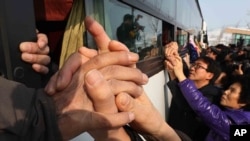South Korean President Park Geun-hye is calling for families separated by the Korean War to be able to communicate via letters and video messaging.
Park directed her cabinet Tuesday to initiate talks with North Korea on the matter. The comments come after the two Koreas last week held face-to-face family reunions for the first time since 2010.
South Korea has proposed holding the meetings regularly, but the North, which often tries to use the meetings as a diplomatic bargaining chip, has not responded.
Tens of thousands of South Koreans have signed up to participate in the reunions. Many are in their 70s and 80s, and are hoping to meet their relatives for the first time in decades. Last year, over 3,000 South Koreans died while on the waiting lists.
Park said Tuesday that in order to accommodate all those who wish to participate, at least 6,000 people should be allowed to meet with relatives on the other side of the border every year.
North and South Koreans are forbidden by their governments to correspond with one another. The two countries remain in a state of war following their 1950s conflict, which ended in a truce, not a peace treaty.
Park directed her cabinet Tuesday to initiate talks with North Korea on the matter. The comments come after the two Koreas last week held face-to-face family reunions for the first time since 2010.
South Korea has proposed holding the meetings regularly, but the North, which often tries to use the meetings as a diplomatic bargaining chip, has not responded.
Tens of thousands of South Koreans have signed up to participate in the reunions. Many are in their 70s and 80s, and are hoping to meet their relatives for the first time in decades. Last year, over 3,000 South Koreans died while on the waiting lists.
Park said Tuesday that in order to accommodate all those who wish to participate, at least 6,000 people should be allowed to meet with relatives on the other side of the border every year.
North and South Koreans are forbidden by their governments to correspond with one another. The two countries remain in a state of war following their 1950s conflict, which ended in a truce, not a peace treaty.





